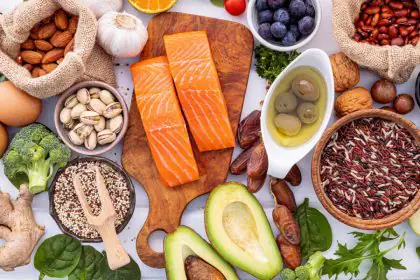The popularity of plant-based diets has surged, capturing the attention of athletes, fitness enthusiasts, and health-conscious individuals alike. But what if we told you that these diets can do more than just support your overall well-being?
High-protein plant-based diets are emerging as powerful allies in muscle recovery, offering a natural and effective way to improve your post-workout routine.
The Science Behind Muscle Recovery
When you engage in physical activities, especially weight training or intense workouts, your muscles undergo stress and small tears. The process of muscle recovery is essential to repairing these tears and helping muscles grow stronger.
Muscle recovery can be influenced by various factors, including rest, hydration, and nutrition. Understanding the science behind muscle recovery begins with knowing how our bodies respond to exercise.
After a workout, your body enters a recovery phase where it repairs damaged muscle fibers and replenishes energy stores. This phase is critical, as it determines how quickly and effectively your muscles can recover.
Muscle Recovery Process
Muscle recovery occurs in three primary stages:
- Injury Response: When you stress your muscles, they experience micro-tears. This signals your body to begin the repair process.
- Repair Phase: Your body uses amino acids (the building blocks of proteins) to repair these micro-tears, resulting in muscle growth.
- Regeneration Phase: Over time, as your muscles recover, they adapt and grow stronger, preparing for future workouts.
The Role of Protein in Muscle Recovery
Protein plays a vital role in muscle recovery. It provides the necessary amino acids that help repair and rebuild muscle tissues.
Without adequate protein intake, your body may struggle to recover fully, leading to prolonged pain and decreased performance.
Plant-Based Proteins vs. Animal Proteins
When discussing protein sources, it’s essential to compare plant-based proteins with animal proteins.
While animal proteins are often considered the gold standard for muscle recovery due to their complete amino acid profile, high-protein plant-based diets can offer significant benefits too.
Comparing Nutritional Benefits
Plant-based diets, such as legumes, nuts, seeds, and whole grains, contain essential nutrients that support overall health, including vitamins, minerals, and antioxidants.
Unlike many animal proteins, plant-based sources are typically lower in saturated fats and cholesterol, promoting heart health.
Digestibility and Absorption Rates
Digestibility refers to how well our bodies can break down and absorb protein. While animal proteins often have higher digestibility, however; well-planned plant-based diets can meet protein needs effectively, especially when consuming a variety of sources.
Benefits of High-Protein Plant-Based Diets
Adopting high-protein plant-based diets can provide numerous benefits, especially for muscle recovery. These are some advantages:
Accelerated Muscle Repair and Growth
Research indicates that athletes following high-protein plant-based diets can experience similar muscle repair and growth as those consuming animal proteins.
The key is to ensure adequate protein intake combined with essential amino acids from diverse sources.
Reduced Inflammation and Oxidative Stress
Plant-based diets are rich in antioxidants and anti-inflammatory compounds, which can help reduce inflammation and oxidative stress following exercise.
This reduction can lead to faster recovery times and improved overall health.
Optimizing Muscle Recovery with Plant-Based Proteins
To maximize muscle recovery with plant-based proteins, it’s essential to identify and add various protein sources into your diet.
Identifying Plant-Based Protein Sources
Here are some excellent sources of plant-based proteins to consider:
- Legumes: Lentils, chickpeas, and black beans are rich in protein and fiber.
- Nuts and Seeds: Almonds, chia seeds, and hemp seeds provide healthy fats and protein.
- Whole Grains: Quinoa, brown rice, and oats are not only protein-rich but also provide complex carbohydrates.
- Soy Products: Tofu and tempeh are complete protein sources that can be added to numerous dishes.
Adding Variety for a Complete Amino Acid Profile
To ensure you’re getting all the essential amino acids, add a variety of protein sources to your meals. For example, combining rice and beans or adding nuts to salads can create a complete protein profile.
Nutritional Considerations for Athletes
Athletes have unique nutritional needs, particularly when it comes to protein intake. Here’s how to assess your protein needs based on activity levels:
- Calculate Protein Requirements: Generally, athletes require between 1.2 to 2.0 grams of protein per kilogram of body weight, depending on the intensity of their training.
- Plan Meals Strategically: Spread protein intake throughout the day, focusing on consuming protein-rich foods within 30 minutes after workouts for optimal recovery.
Maximizing Plant-Based Proteins for Performance
To further improve your performance and recovery:
- Consider Protein Supplements: If meeting protein needs through whole foods is challenging, consider plant-based protein powders made from peas, brown rice, or hemp protein.
- Stay Hydrated: Proper hydration supports digestion and absorption, making it easier for your body to utilize protein effectively.
Sustainability and Environmental Impact
Beyond personal health benefits, high-protein plant-based diets contribute to sustainability and environmental conservation.
Ethical Considerations of Plant-Based Diets
Choosing High-Protein Plant-Based Diets helps reduce the demand for animal agriculture, which is a significant contributor to greenhouse gas emissions.
By adopting plant-based diets, you can contribute to ethical and sustainable food systems.
Reducing Carbon Footprint Through Plant-Based Eating
Research shows that plant-based diets have a lower environmental impact compared to meat-heavy diets.
Transitioning to high-protein plant-based diets can significantly reduce your carbon footprint, making it a responsible choice for the planet.
Case Studies and Success Stories
Many athletes have thrived on high-protein plant-based diets. Here are a few inspiring examples:
- Scott Jurek: An ultramarathoner known for his plant-based lifestyle, Jurek attributes his success to his plant-based diets, which fuel his performance and recovery.
- Venus Williams: The tennis champion switched to plant-based diets to combat autoimmune issues and improve her performance, proving that plant-based diets can support high-level athletics.
Impacts on Long-Term Performance and Recovery
Athletes following high-protein plant-based diets have reported improved recovery times and sustained energy levels during competition.
With proper planning and a diverse diet, these athletes can achieve optimal performance and health.
Conclusion
The benefits of high-protein plant-based diets for muscle recovery are clear. Not only do these diets provide essential nutrients for repair and growth, but they also offer additional health benefits, promote sustainability, and support ethical eating.
By adding a variety of plant-based proteins into your diet, you can improve your muscle recovery, improve performance, and contribute positively to the environment.
FAQs
Does plant protein help muscle recovery?
Yes, plant protein supports muscle recovery by providing essential amino acids necessary for repairing and rebuilding muscle tissues.
Is plant-based protein good for muscle building?
Absolutely! Plant-based protein can effectively support muscle building, especially when consumed in adequate amounts and from diverse sources.
Is high protein good for muscle recovery?
Yes, a high-protein diet is beneficial for muscle recovery, as protein helps repair damaged muscle fibers and promotes growth.
What are the benefits of high-protein Plant-Based Diets for muscle building?
A high-protein diet aids muscle building by supporting recovery, enhancing muscle repair, and providing the necessary nutrients for growth.







